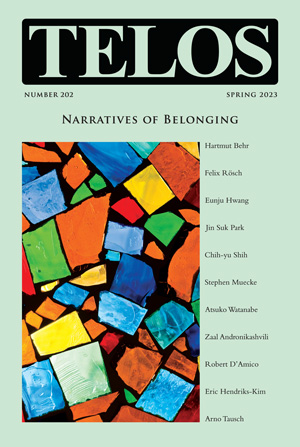Telos 202 (Spring 2023): Narratives of Belonging is now available for purchase in our store. Individual subscriptions to Telos are also available in both print and online formats. Online subscribers have access to the full issue at the Telos Online website. The following is an excerpt from the issue’s introduction by Hartmut Behr and Felix Rösch, who are the issue’s guest editors.
Introduction: Narratives of Belonging—The Interrelation between Ontological-Epistemological Observations and Narrative Methodology
Hartmut Behr and Felix Rösch
1. Introduction
 In a recent editorial, the Lancet reported that one of the consequences of pandemics is the detrimental impact “on the mental health of affected populations,” and the current COVID-19 one is no different. Since its outbreak at the end of 2019, “depressed mood, anxiety, impaired memory, and insomnia” are constant companions of people around the world. Many even experience “stress, burnout, depression, and post-traumatic stress disorder.” Amongst its concerns, the Lancet notes the rising “misuse of substances” as a consequence of these mental health problems.[1] One of the reasons for this global mental health crisis is the way the pandemic affects peoples’ practices of community building and rituals of belonging. Having to wear masks, being required to keep at least 1.5 meters apart, not being able to meet (vulnerable) friends and family members, and even more drastic measures like weeklong lockdowns fundamentally disrupted everyday lives and reduced opportunities to socialize. What is normally taken for granted is being challenged. Around the world, these measures have been met by increasing demonstrations, often based on conspiracy theories and against commonsense precautions for preventing a potentially lethal disease. This conflict between reasonable precaution and emotional stress and pressure suggests disruptions of common narratives of belonging.
In a recent editorial, the Lancet reported that one of the consequences of pandemics is the detrimental impact “on the mental health of affected populations,” and the current COVID-19 one is no different. Since its outbreak at the end of 2019, “depressed mood, anxiety, impaired memory, and insomnia” are constant companions of people around the world. Many even experience “stress, burnout, depression, and post-traumatic stress disorder.” Amongst its concerns, the Lancet notes the rising “misuse of substances” as a consequence of these mental health problems.[1] One of the reasons for this global mental health crisis is the way the pandemic affects peoples’ practices of community building and rituals of belonging. Having to wear masks, being required to keep at least 1.5 meters apart, not being able to meet (vulnerable) friends and family members, and even more drastic measures like weeklong lockdowns fundamentally disrupted everyday lives and reduced opportunities to socialize. What is normally taken for granted is being challenged. Around the world, these measures have been met by increasing demonstrations, often based on conspiracy theories and against commonsense precautions for preventing a potentially lethal disease. This conflict between reasonable precaution and emotional stress and pressure suggests disruptions of common narratives of belonging.







